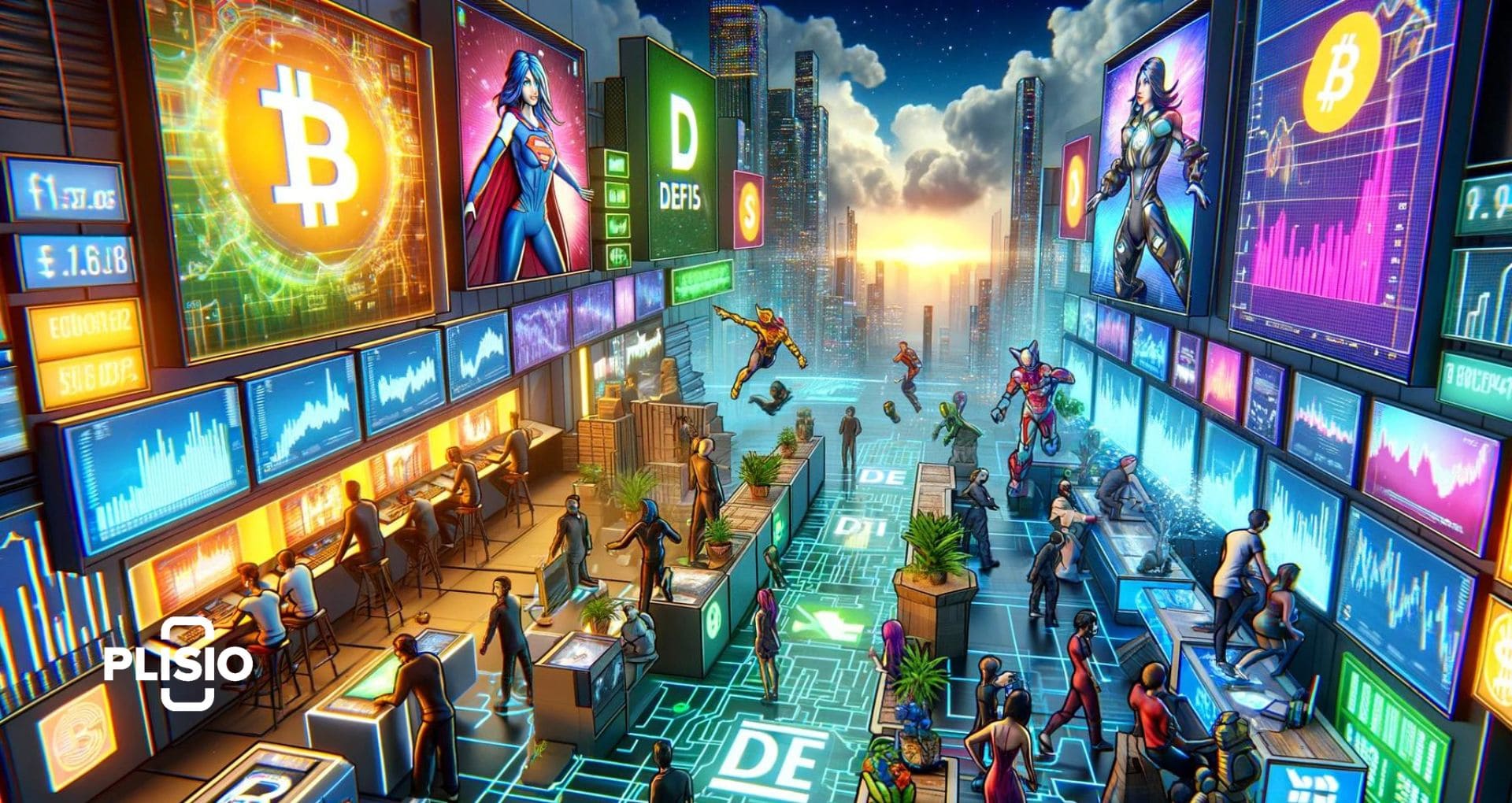Best DeFi Exchanges

In the swiftly evolving realm of cryptocurrency trading, DeFi exchanges stand out as a transformative breakthrough, granting users unprecedented control, enhanced security, and greater versatility. Their rising popularity and distinctive characteristics position DeFi exchanges as a compelling option compared to conventional centralized exchanges. So, are you prepared to embark on an exploration of the top DeFi exchanges in 2023, delving into this captivating domain?
What Is The Best Exchange for DeFi?
The DeFi exchanges we've evaluated cater to a wide range of preferences, from trading particular tokens to utilizing sophisticated DeFi functionalities and engaging in more complex leverage trading. Selecting the ideal DeFi exchange should be based on your trading preferences and level of experience. Our reviews are designed to guide you towards making the best choice for your needs.
PancakeSwap
PancakeSwap stands out as the leading DeFi platform for users interested in the Binance Smart Chain (BSC) ecosystem, renowned for its pivotal role in facilitating trades of BSC tokens. It often becomes the go-to platform for new BSC tokens looking to debut in the market. Here's what sets PancakeSwap apart:
Advantages:
- Recognized as the premier DeFi platform for engaging with BSC tokens.
- Grants early access to emerging projects within the BSC space, allowing users to be part of new developments from the start.
- Offers opportunities for earning through various DeFi mechanisms such as farming and staking, enhancing its value for users.
- Simplifies the trading process by eliminating the need for account creation; users can directly link their wallets and start trading.
Disadvantages:
- Limited to transactions within the Binance Smart Chain, lacking versatility in blockchain interoperability.
- Lacks features like crypto savings accounts that could offer additional financial benefits to its users.
With its emphasis on BSC tokens and an intuitive interface, PancakeSwap is an attractive option for both newcomers and seasoned investors interested in the Binance Smart Chain. Its commitment to early project access and yield-generating activities further solidifies its position as a go-to DeFi exchange in this niche market.
dYdX
dYdX distinguishes itself as the go-to DeFi exchange for enthusiasts and professionals in the crypto derivatives market. It specializes in offering perpetual contracts with the potential for up to 20x leverage, catering especially to those with a penchant for high-stakes trading strategies.
Advantages:
- Stands out as the leading decentralized platform for trading in crypto derivatives.
- Offers significant leverage options, up to 20x, allowing for aggressive trading strategies.
- Boasts a high volume of daily trading activity, indicating a robust and active trading community.
Disadvantages:
- Currently lacks a fully developed Android application, limiting accessibility for some users.
- The platform's complexity and focus on high leverage may pose challenges for newcomers to the trading scene.
With its strong emphasis on crypto derivatives and leveraged trading, dYdX serves as a premier choice for experienced traders looking for sophisticated trading mechanisms. The platform's significant daily trading volumes reflect its status as a key player in the derivatives space, despite the ongoing development of its mobile accessibility and a learning curve that may deter newer traders.
Uniswap
Uniswap proudly asserts its position as a leading DeFi exchange, especially favorable for beginners diving into the world of cryptocurrency trading. It is renowned for its significant trading volume across ERC-20 tokens and its interoperability with several blockchain networks such as Ethereum, Binance Smart Chain, Polygon, Celo, Optimism, and Arbitrum, making it a versatile platform for a broad array of digital assets.
Advantages:
- Offers deep liquidity pools for a wide range of popular ERC-20 tokens, facilitating smoother trades.
- Requires no Know Your Customer (KYC) procedures, ensuring privacy and ease of access for new users.
- Stands out for its robust yield farming opportunities, attracting both novice and seasoned DeFi participants.
- Integrates with over 300 decentralized applications (dApps), demonstrating its utility and flexibility within the DeFi space.
Disadvantages:
- Trading fees of 0.3% may be perceived as comparatively steep, especially for frequent traders looking to maximize their returns.
Uniswap's exceptional liquidity, along with its broad support for various blockchain ecosystems, solidifies its status as an excellent starting point for beginners eager to explore trading ERC-20 tokens and engage with the expansive DeFi landscape.
Benefits of Using DeFi Exchanges
DeFi exchanges provide numerous benefits when compared to traditional centralized platforms, including enhanced security features and seamless integration with DeFi services. Operating on a peer-to-peer model and powered by smart contracts, these exchanges remove the need for middlemen, effectively reducing counterparty risks. This ensures that users maintain complete control over their digital assets at all times.
Moreover, DeFi exchanges typically impose lower transaction fees than their centralized counterparts, with rates starting as low as 0.1%. In the cost-conscious world of trading, these reduced fees can significantly impact a trader's net gains, making DeFi exchanges an economically attractive option for optimizing profitability.
How to Pick a DeFi Exchange?
When selecting a DeFi exchange, it's crucial to assess various essential aspects to ensure a secure, efficient, and user-friendly trading experience. Here's an enhanced guide, incorporating additional relevant information, to aid you in choosing the ideal DeFi exchange:
- Security Measures: The DeFi space has witnessed its share of security breaches, including dex hacks and exploits. It's vital to opt for an exchange with a robust security track record. Look for platforms that regularly undergo security audits and have measures in place to protect against unauthorized access and funds loss.
- Liquidity Levels: High liquidity facilitates smoother and quicker transactions with minimal price impact (slippage). Platforms like DeFiLlama offer insights into an exchange's liquidity, trading volume, and user activity, helping you gauge its market strength.
- Ease of Use: The user interface and overall user experience can vary widely across DeFi exchanges. Explore different platforms to find one that matches your comfort level, especially if you're new to DeFi trading.
- Token Variety: While some traders prioritize mainstream cryptocurrencies, others seek access to a broader range of tokens, including emerging altcoins. Exchanges like SushiSwap are known for offering an extensive selection of tokens, catering to diverse investment interests.
- Fee Structure: Transaction fees can significantly affect your trading profitability, especially during periods of high network congestion. Utilize tools like 1inch to compare fees across exchanges and identify cost-effective trading opportunities.
- Community and Reputation: Many DeFi exchanges are governed by Decentralized Autonomous Organizations (DAOs) with active communities. Engaging with these communities can provide insights into the exchange's reliability, governance practices, and responsiveness to user concerns.
- Wallet Integration: Ensure the exchange supports integration with your preferred digital wallet. Advanced interoperability features, allow for seamless connectivity across a wide range of wallets, enhancing your trading flexibility.
By carefully evaluating these factors, you can make an informed decision and select a DeFi exchange that best suits your trading needs and preferences, ensuring a secure and efficient trading environment.
What Are The Best DeFi Exchanges For Beginners?
For newcomers to the decentralized finance (DeFi) world seeking the most suitable exchanges, Uniswap and SushiSwap emerge as excellent choices due to their accessibility and comprehensive features.
Uniswap shines as a gateway for beginners with its uncomplicated interface and straightforward trading mechanics. The platform's ease of use, combined with a vast selection of tokens, allows new users to engage with DeFi transactions confidently. Uniswap's popularity has fostered a strong community, providing an abundance of tutorials and support materials that can help beginners understand how to make the most out of their DeFi experience.
SushiSwap extends a warm welcome to beginners as well, offering a simple swap feature akin to Uniswap. It distinguishes itself by introducing additional functionalities like yield farming and staking, presenting opportunities for newcomers to explore passive earning avenues in crypto. SushiSwap's platform is designed to be approachable, supported by a vibrant community that contributes to a supportive environment for novice users.
Embarking on a DeFi journey with either Uniswap or SushiSwap can be a wise choice for beginners. However, it's important to proceed with caution and make informed decisions. Starting with smaller investments and gradually expanding one's understanding and portfolio in the DeFi space is advisable to navigate the inherent risks effectively.
What Is The Safest DeFi Exchange?
Uniswap distinguishes itself as a particularly secure choice among DeFi platforms, bolstered by various attributes that enhance its credibility and safety. As a pioneering and extensively adopted decentralized exchange (DEX), Uniswap benefits from a broad user base and a track record of reliable operation since its inception. This established presence and widespread use signal a strong trust level among participants in the DeFi ecosystem.
Critical to its security standing, Uniswap's smart contract code has undergone thorough audits by renowned security organizations, aiming to identify and rectify potential weaknesses. Such rigorous auditing processes help in significantly reducing the risk of vulnerabilities that could compromise user assets.
Moreover, the platform's commitment to transparency through its open-source model invites ongoing scrutiny and contributions from the community. This collaborative approach not only facilitates continuous enhancements in security practices but also fosters a collective responsibility towards maintaining and strengthening the platform's integrity.
Legal and Tax Considerations for DeFi Exchanges
The regulatory landscape for decentralized exchanges (DEXs) remains somewhat ambiguous, with legal guidelines differing from one region to another. It's essential for users to familiarize themselves with the specific legal standing of DEXs within their jurisdiction and stay informed about any regulatory developments that might impact their trading activities.
From a taxation perspective, transactions conducted on DEXs are treated similarly to those on centralized platforms in terms of tax liabilities. Users are required to report their capital gains or losses from each transaction, adhering to the tax laws applicable in their locality. Maintaining precise records of your trades and seeking advice from a taxation expert can greatly assist in managing the intricacies of crypto-related taxes, ensuring compliance, and avoiding possible legal repercussions.



